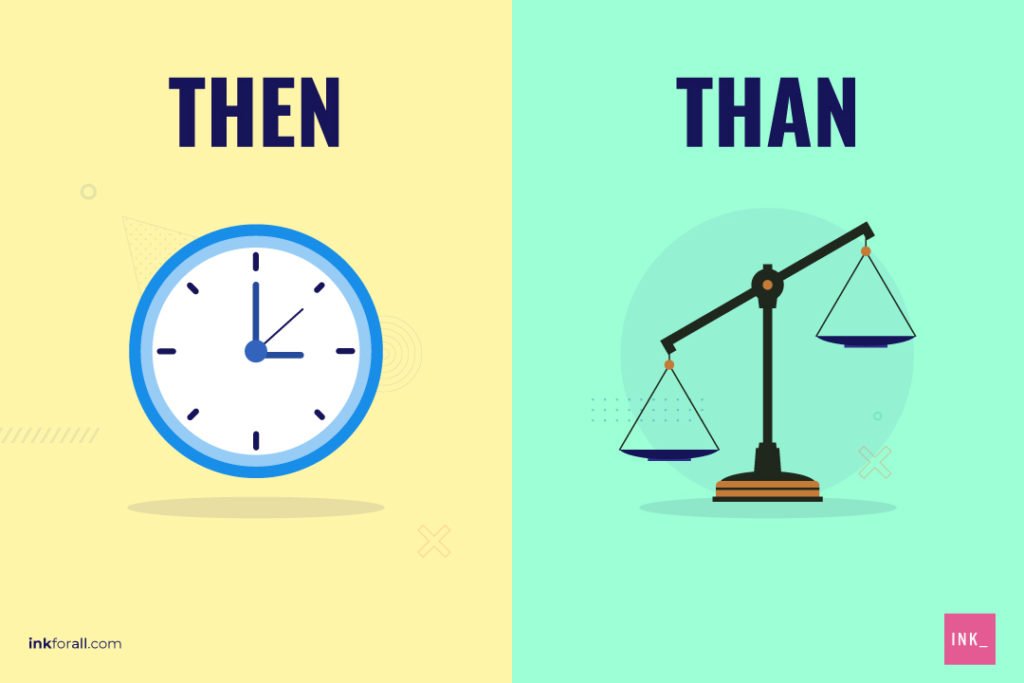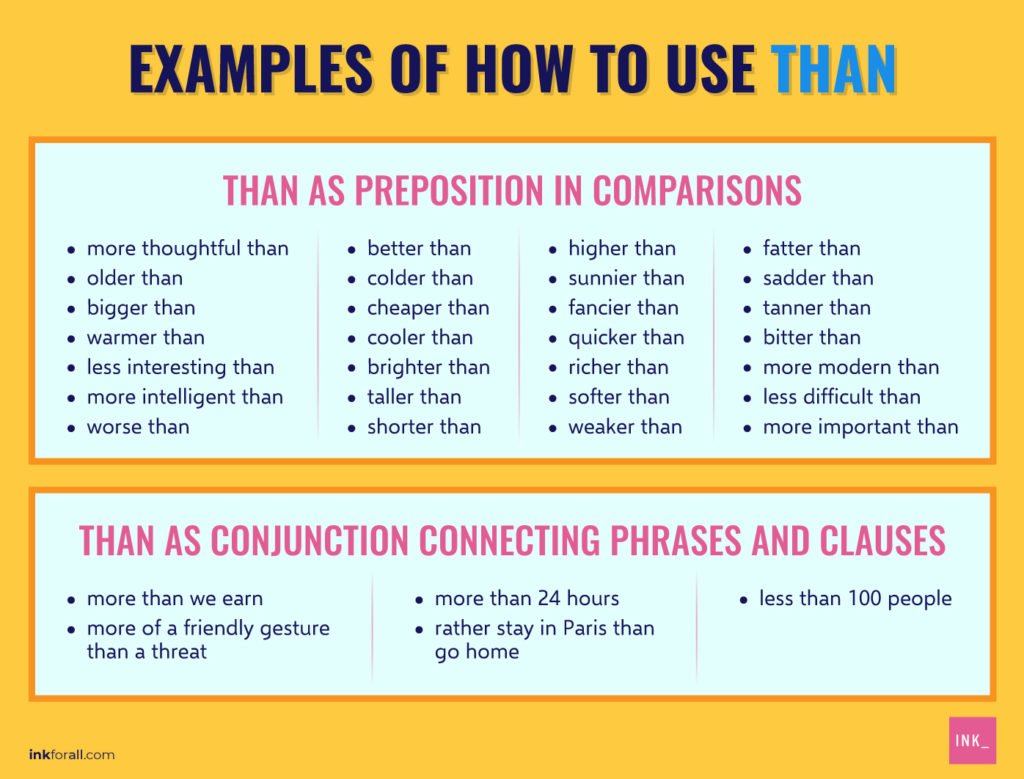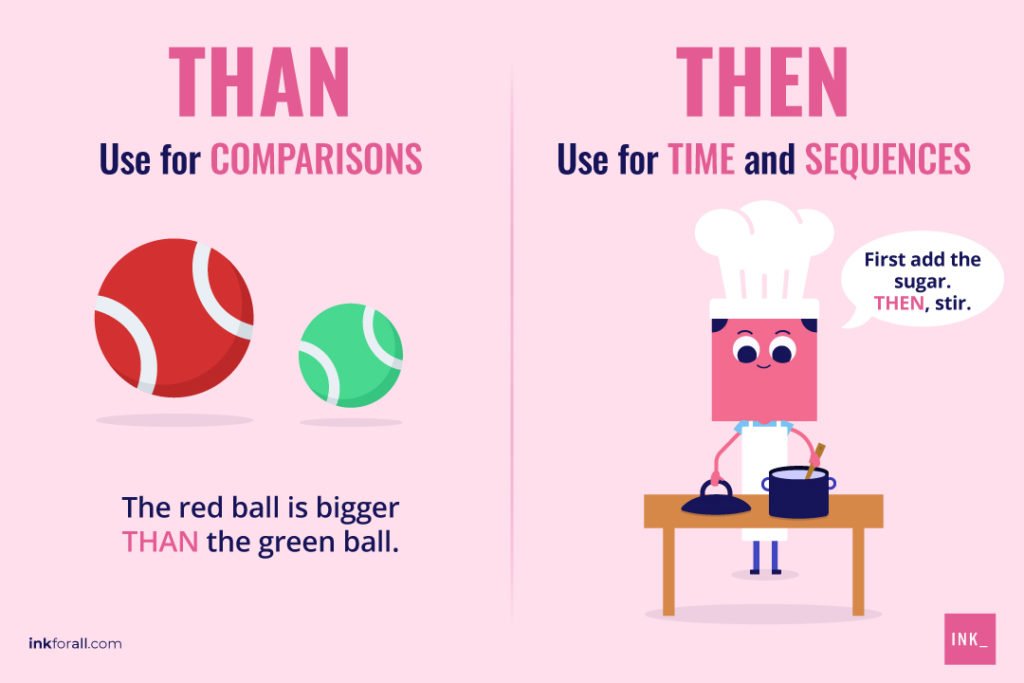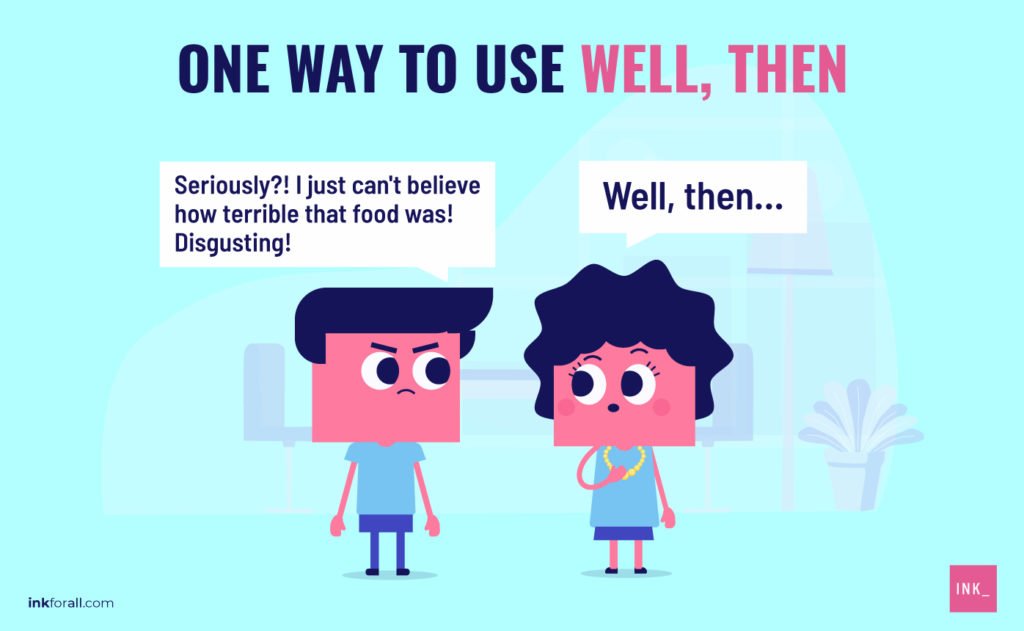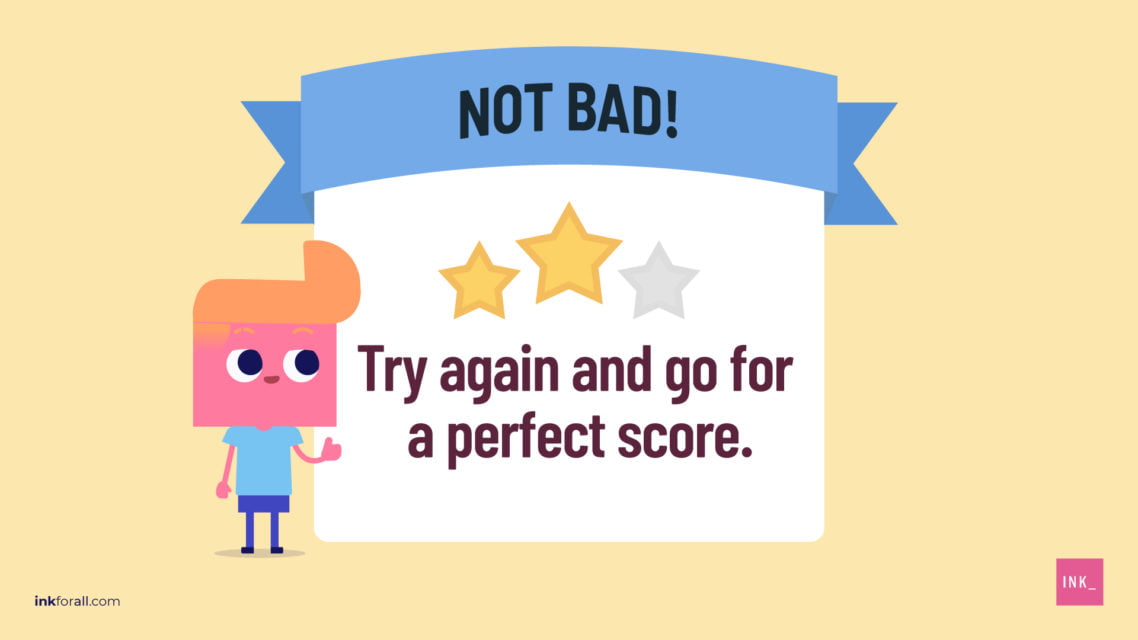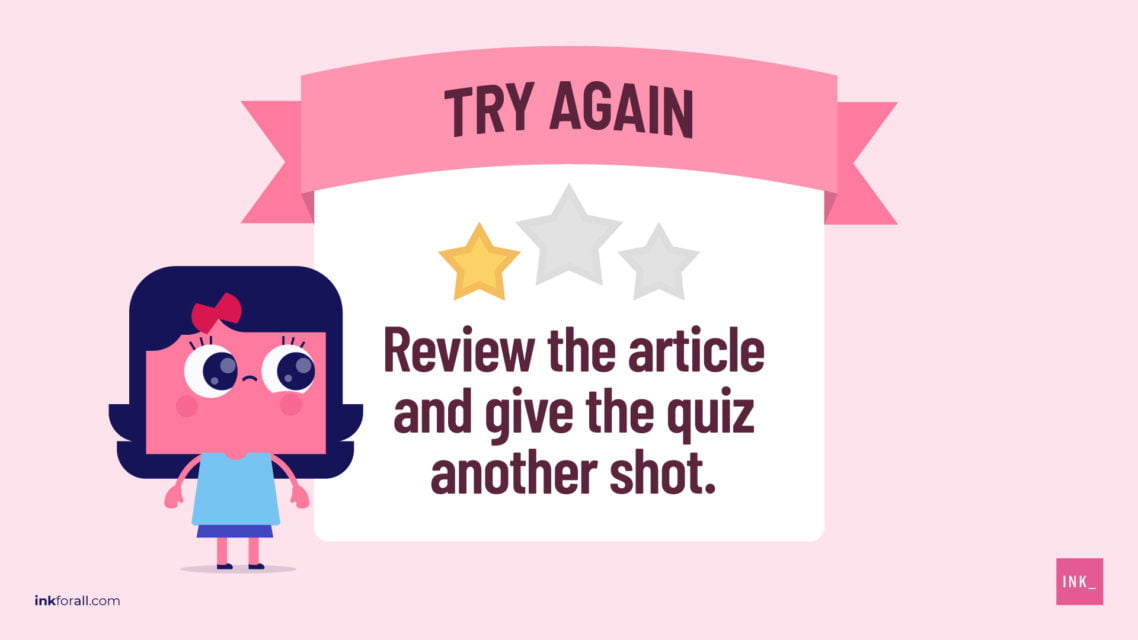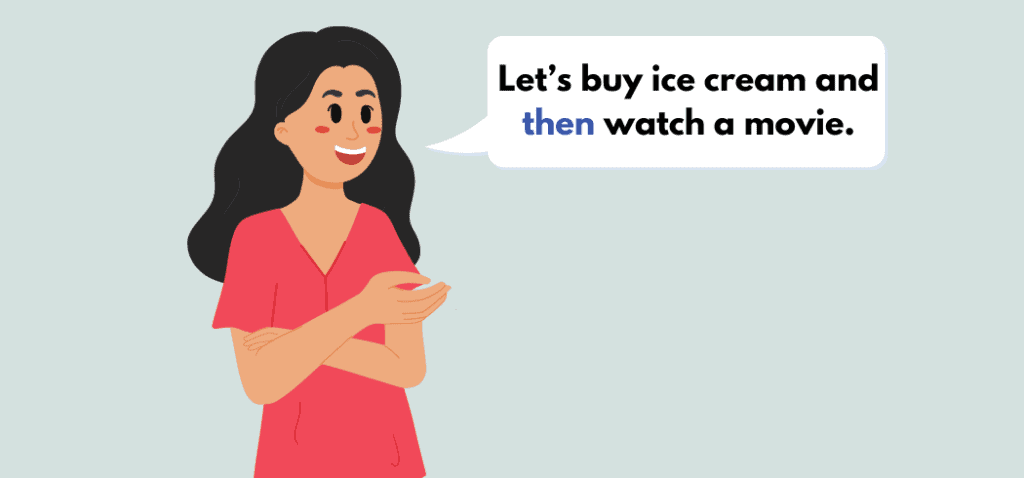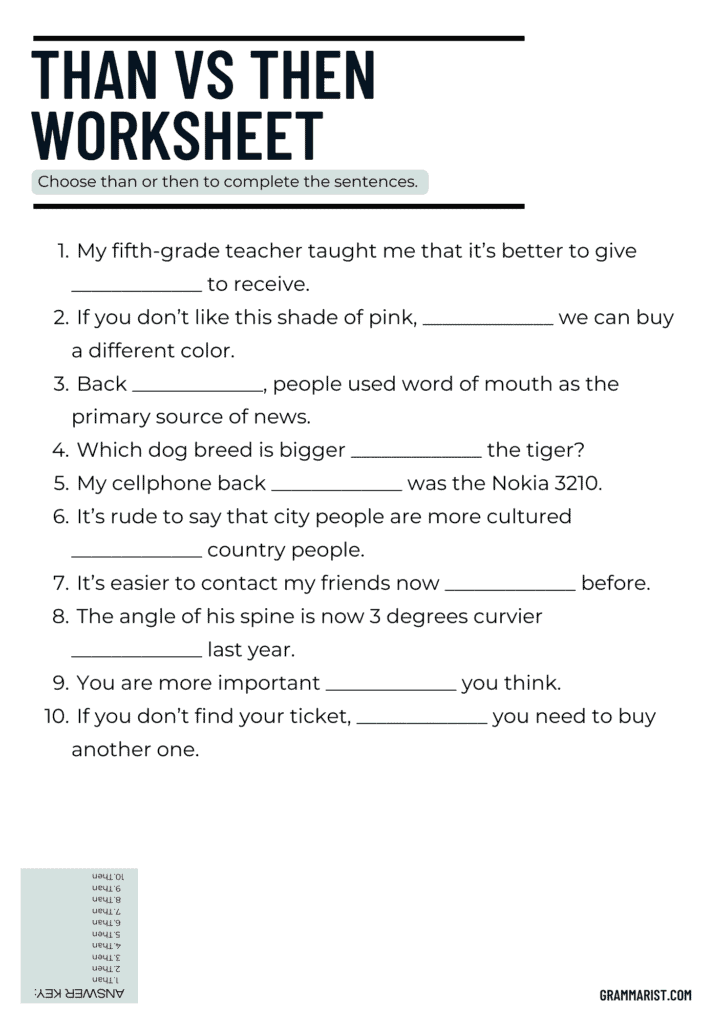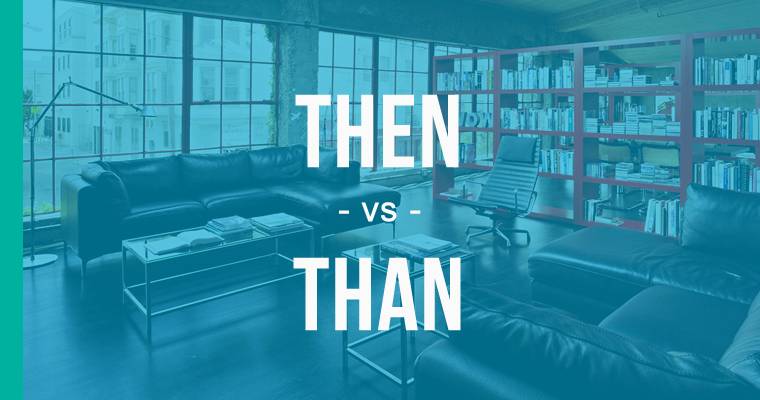Main Than vs. Then Takeaways:
- Then and than are homophones. This means that they sound almost identical when spoken but have different meanings and spellings.
- When you think of then, think of time.
- When you think of than, think of comparisons.
- Sometimes, than can be used to indicate time, but it is still typically a comparison.
- Then can be an adverb, adjective, or noun.
- Than is a conjunction.
Like affect vs. effect and to vs. too, than vs. then cause a lot of confusion. While many use these homophones interchangeably, they are not the same. Choosing the wrong word may mean that you don’t communicate your message clearly or correctly. In fact, than and then have different functions and meanings. But, there are, of course, some exceptions. Here, we’ll make sure you have everything you need to keep them straight, once and for all.
Then vs. Than Rule
Here’s the best way to tell the difference between then vs. than: associate then with time and than with comparisons. For example, use then for clarifying a sequence of events like writing a recipe or retelling a story (“We went to the supermarket and then headed home.”). Try remembering that the “e” in “then” stands for “events.”
Conversely, use than when making a comparison (“We like going to the smaller shop nearby more than going to the supermarket.”).
You might see then in a comparison, but always about time (“Back then, we were less timid than we are now.”).
Than vs. Then Exception: Comparisons About Time
There is one exception. Sometimes, than can appear in comparisons about time. But in these cases, there is still a comparison involved.
In this example, we’re dealing with time, but it’s secondary. The main function of than here remains the same: to make a comparison.
“He” is comparing his meeting time to 12 pm. He’ll be there no later than noon. In other words, other times are being compared to that one particular time-related target.
This may be confusing because we’re not drawing a 1:1 comparison between two individual things (he arrived earlier than I arrived); instead, we’re comparing one individual thing (12 pm) to a group (all times before 12 pm). Nevertheless, this is ultimately a comparison and as a result, should use then.
What Type of Word is Then?
Then usually refers to time and can function as three types of speech. First, then is usually an adverb (“If you leave, then turn off the lights”). Second, then can be an adjective (“Jackie Kennedy, then Jacqueline Onassis, studied literature“). Finally, it can be a noun (“See you then?” or “We’ll wait until then”). Conversely, than is a conjunction and is for making comparisons (“This cake is sweeter than that brownie”).
How is Then Used in a Sentence?
Then vs.than breaks down to time vs. comparisons. For instance, there are several ways to use then, and they all indicate time. Most often, then is an adverb to help clarify a sequence of events (“Wash then dry the dishes”). What’s more, then helps describe a condition and then a consequence (“If it rains, then we’ll eat inside”). Additionally, then can also be an adjective (“The then CEO”). Finally, then can be a noun (“I’ll see you then!”).
Then can function as several parts of speech. Most often, it’s found working as an adverb in sentences where time is involved, but can also be an adjective or noun. Use then to:
- Clarify a sequence or indicate the order in which certain actions occurred
- Illustrate the relationship between several actions or items
- Illustrate the consequences of a certain action
- Indicate a previously held position
Clarify a Sequence (Adverb)
Describe the Relationship Between a Condition and Consequence (Adverb)
You could also use then to tell the reader when something caused something else to happen. Those examples typically frame the second action as a consequence of the first. In that case, you’ll probably use an if/then construction, making it clear the connection between the two actions.
Indicate a Previously Held Position (Adjective)
Remember, then can be an adjective, an adverb, or a noun. It’s most often used in sentences that are discussing time. You might be demonstrating a series of events, indicating a relationship between several actions.
Refer to Past or Future Time (Noun)
How is Than Used in a Sentence?
Than is a conjunction used for comparisons (“She is taller than I am”).However, then is an adverb, adjective, or noun related to time. A point of overlap is that than can appear in comparisons about time (“Please arrive no later than 9 a.m.”).
Overall, than is important because it helps enrich the level of clarity and detail in your writing.
When the relationship between the nouns, verbs, and adjectives in a sentence isn’t equal, you can use than to indicate that one takes precedence. This helps clarify status, physical stature, order of operations, and other important information.
Like other conjunctions, than is used to connect two clauses or two words within the same clause. Unlike other conjunctions, than is specifically used to compare and contrast.
Than helps us understand which is bigger, better, louder, or simply more favored. For example, using “than” is a good way to paint a picture of how items contrast each other.
Here are easy examples of how to use than vs. then in a sentence:
Use the phrase “other than” when describing exceptions. You can replace other than with alternatives like except for and besides.
How to use Less Than and More Than
How to use More Than in a Sentence
How to Use Less Than in a Sentence
Common Expressions: Than vs. Then
Is it Other Than or Other Then?
The correct phrase is “other than” and not “other then.” Use “other than” to indicate an exception (“Other than cats, she’s not a fan of animals”). The item or situation that comes directly after “other than” is the only example mentioned that doesn’t fit into the described scenario. In this way, this structure compares the exception to the rule. Therefore, “other than” expresses a comparison. Since we use than for comparisons and then for time, “other then” doesn’t make sense here.
Is it Well Then or Well Than?
The correct phrase is “well then“, not “well than.” Use the phrase well then to switch topics. Similarly, use this phrase to start concluding a conversation or saying goodbye (Well then, I have to go. See you tomorrow!). Moreover, if a person says something strange or interesting, the response well then indicates that you’re surprised and unsure of what else to say. For this reason, some use it sarcastically.
For instance, say your friend has a history of jumping and hitting their head. You might ask them whether they think that’s a good idea. When they reluctantly say, No…, you could respond with, Well then….?! to suggest they should know better.
If someone makes a strong display of emotion or a comment that you find surprising, provocative, or offensive comment, you might respond with well then.
Notice that because “well” is an interjection in these examples, there’s often a comma between “well” and “then.”
Is it Rather Than or Rather Then?
The correct phrase is “rather than“, not “rather then.” This is because than is most commonly used in comparisons (“He’s taller than her”) while then is more for discussing time (“Sal went to the store then stopped by the post office”). Since “rather than” compares two actions or choices, it only makes sense to use “rather than” instead of “rather then.”
Is it Older Than or Older Then?
Both “older than” and “older then” are correct. But, they are not interchangeable because they mean different things. Usually, we use then for time and than for comparisons. However, this question is confusing because both “older than” and “older then” deal with time and comparisons, but in different ways. Use “older than” to compare the age of one person to that of another person (“My sister is older than I am”). On the other hand, we use “older then” to refer to a time other than the present (“See you then!” Let’s wait a week and buy it then”).
Technically both options are correct. Which one you choose to use depends on your message and the surrounding context.
Rather than accidentally making a mistake with then or than in the future, bookmark this page and review as needed. Happy writing!
Is it Better Than or Better Then?
The answer will depend on the context of your statement. If you’re comparing two things in your sentence, then the correct phrase is “better than.” However, if you are referring to a certain time in the past as better, then “better then” is the right phrase. See examples below:
Let’s see if Then and Than Still Confuse you
Then vs Than Question #1
A. The word “then” mostly functions as an adverb in a sentence.
B. Then can function as an adjective, adverb, or noun.
C. You can use “then” and “than” interchangeably in a sentence.
D. Then is often used in sentences that are discussing time.
Correct!
Wrong!
The answer is C. “Then” suggests the order in which specific actions occurred, while “than” is used for comparison.
Then and Than Question #2
Correct!
Wrong!
The answer is TRUE. Although both words sound alike, they have different meanings.
Than Question #3
Preposition
Conjunction
Both
Correct!
Wrong!
The answer is BOTH. “Than” is a conjunction or preposition, depending on how it is used in a sentence.
Than or Then Question #4
Correct!
Wrong!
The answer is THAN. “Than” is commonly used in comparisons.
Then or Than Question #5
Correct!
Wrong!
The answer is THEN. “Then” is used to indicate time.
Then vs Than Question #6
Correct!
Wrong!
The answer is THAN. “Rather than” compares two actions or choices, with the person in question opting for one over the other.
Than vs. Then Quiz Result
Expert!
Not bad!
Almost got it! Review the article and try again.
Read More: What’s The Difference Between Yea, Yeah, and Yay?
Even Native English speakers mess up than and then because of their similar spelling and pronunciations. However, their meanings significantly vary.
This guide will show you nuanced differences between then vs. than. Learn when to use the two words in the sentence before the self-anointed grammar policemen point out your grammar error.
Then vs. Than: What’s The Difference?
Then is an adverb, noun, or adjective that indicates a previous time. Meanwhile, than is a conjunction used when comparing two items or people.
Use then in writing or events when there is an element of time. In the English language, then means at that time, at that point, or next. You’ll find it in phrases like since then and until then to show a reference of time.
Use than in common phrases like better than, further than, taller than, or broader than. You’ll find this word after terms like other, less, more, and rather.
In Middle English, then and than used to be the same word used for all their meanings. People used them to show relationships with time and for comparison purposes. However, modern writing now treats them differently.
That’s why the two words are now homophones people get confused with. Homophones are words that show an essential difference in spelling but similarities in sound.
When to Use Then
You can use then as an adverb to replace at that time in question to make grammatical sense. This adverb helps you place events in time in order, such as when relating to a future time.
Examples:
- But by then, Shannon might be tired.
- Let’s buy ice cream and then watch a movie.
Here’s a longer, multilayered example of then relating to the future.
My first subject is Chemistry, then French, then Science. Then, I’ll have lunch, go to Math class, and go home.
Then can also mean previous or former. Some English speakers use the term if they can’t recall the exact time of an event in the past. Here are some sentences that use then relating to a previous time.
Examples:
- The then president visited our small town.
- We lived in San Diego then.
Aside from using then in terms of time, you can also use it to show consequence or mean in that case.
Examples:
- If you had taken care of the cat, then we wouldn’t be in this situation.
- I slept late, so then I woke up dizzy.
When to Use Than
Making an unequal comparison requires using a particular word in the English language. Than is the conjunction that expresses a form of comparison in a sentence. Use it to introduce the second item or person to make direct comparisons.
For instance, when you say “truth is stranger than fiction,” it means that real events are more unnatural than imagination.
Examples:
- My mother told me that a curious person is better than a know-it-all.
Is it Earlier Than or Earlier Then?
Both phrases are correct but have different meanings. The more common phrase you might be looking for is earlier than. For example, you might arrive at school earlier than usual. However, you used to come earlier then.
Is it Later Then or Later Than?
The correct phrase is later than if you want to show a comparison between two late items, people, or events.
Is it Rather Then or Rather Than?
The correct term is rather than since rather is used to show preference in a specific matter. For instance, you might know someone who wants wine rather than a martini.
Is it Other Than or Other Then?
Other than is the appropriate phrase as it means apart from or except.
Is it Better Than or Better Then?
Better than is one of the most popular phrases with the word than. To be better than something or someone means you’re superior or more excellent.
Is it More Than or Then?
The appropriate phrase is more than, which indicates a bigger value or amount. It can also mean extremely, as in more than gratefulto be reading this post.
Is it Less Then or Less Than?
Use less than as a synonym for far from or certainly not.
It is Well Then or Well Than?
The correct phrase is well then to indicate that what someone said was unexpected or inappropriate. Well than is a wrong phrase because well is not in its comparative form.
Than Me or Than I?
The traditional rule is to use than I because the longer version of the sentence is typically than I am. However, it can lead to outdated-sounding language, especially if you use a different pronoun.
Example:
- He is smarter than she.
- He is smarter than I.
Can You Start a Sentence With Then?
You can start a sentence using then when showing a list of events or a chronology of events.
Example:
- I read a book last night. Then I got hungry and ordered food.
How Do You Use Than in a Sentence?
Here are plenty of examples of how you can use than in a sentence.
An asteroid wider than two football fields will zoom past Earth in the wee hours of Thursday (Aug. 4). The asteroid is set to pass at 12:23 a.m. (ET). [Live Science].
Indeed, it may have been no more than a coincidence that Tsai Chi-chang, deputy speaker of Taiwan’s legislature, appeared to respond to Pelosi’s suit by wearing a pink tie to meet her on Wednesday morning. [CNN].
She recalls one episode in which a former employer chastised her and two other assistants, each of whom made more than $150,000 a year, she says, for putting bananas in the refrigerator, instead of on the kitchen counter. [Wall Street Journal].
The arrests on Tuesday near Krugersdorp, a city northwest of Johannesburg, bring the total number of people detained since the attack to more than 120. [The Guardian].
How Do You Use Then in a Sentence?
Let’s take a look at these examples of then in sentences.
Shark! Man in New Jersey catches, then releases a 7-foot sand tiger shark. [Fox News].
Speaking to CNN, the congresswoman Carolyn Maloney said sorry for broaching the issue in a debate – but then said again she thought Biden would not run. [The Guradian].
No, because smartphones bring these three features into one product. Then why should organizations pay for three different products, when it is indeed possible to bring all these aspects into one smart product? [Forbes]
The Real Difference Between Than vs. Then
One of the writing issues that English speakers and writers face is the confusion between than vs. then. Using the two words interchangeably can be annoying for grammar perfectionists, even in informal writing. Remember:
- Use then in a sentence when referring to a sense of time, whether past or future. You can also use it to show consequences.
- Use than to feature comparisons between two unequal items, places, persons, or events.
Answer the worksheet below to test your knowledge of this homophone.
/ / Uncategorized
What’s the Difference Between Then and Than?
Contents
- 1 What’s the Difference Between Then and Than?
- 2 Using Then in a Sentence
- 3 Using Than in a Sentence
- 4 Remembering Then vs. Than
- 5 Outside Examples
- 6 Quiz: Than vs. Then
- 7 Article Summary
Then and than have similar pronunciations and spellings. In fact, one of the pronunciations of than is exactly the same as then. However, these words have no overlap, and they are also different parts of speech.
Then is usually an adverb, but it can also be an adjective or a noun. The most common definition for then is at that time.
- I’m not a dancer now, but I was when I was younger. Back then I danced all the time!
Than is a conjunction used most often in comparisons between two things.
- A giant is taller than a dwarf.
Now that you know the differences between these two words, let’s look at them in context to ensure you don’t confuse one for the other.
Using Then in a Sentence
When to use then: Then can act as an adverb, adjective, or noun. As an adverb, it can mean at that time, next, or consequently. As an adjective, it can describe someone or something as being a certain way at that time in the past, but not now. As a noun, it can mean that time.
For example,
- He played soccer then took a shower. (adverb meaning 2)
- If you aren’t going to study then you’ll fail the test. (adverb meaning 3)
- The then president embezzled a large amount of money. (adjective meaning)
Then also appears in some expressions:
- but then again: on the other hand
- No, thanks. I don’t want any ice cream. But then again, I did just finish my diet yesterday. I guess I will have some ice cream.
- right then and there: at exactly that time and place
- They couldn’t believe that that doctor started singing right then and there, in the middle of the surgery!
- and then some: and even more than that
- She added the amount of alcohol that the recipe noted, and then some!
- now and then: occasionally or at times
- The professor does have a drink at the bar now and then, but not very frequently.
- until then: goodbye until we meet again
- Yes, I’ll see you at the party on Saturday. Until then!
Then is more common than than and appears in both formal and informal speech.
Using Than in a Sentence
When to use than: Than is a conjunction. It appears with comparative adjectives including, but not limited to, better, worse, and faster. It can also appear in sentences that express no choice except for one.
Additionally, than can show preference between two things.
- She doesn’t even study and she’s still smarter than me. (first definition)
- I wanted to get here earlier, but because my car broke down I had no choice other than to walk. (second definition)
- I’d rather exercise by lifting weights than by running. (third definition)
Than also appears in some expressions:
- actions speak louder than words: Doing something shows more commitment than saying something.
- You keep saying that you’ll work harder, but you never actually do work harder. Actions speak louder than words!
- better late than never: Doing something late is better than never doing it at all.
- I’m sorry I sent you this thank-you card so late, but better late than never, I suppose.
- better safe than sorry: It is better to be safe than it is to take a risk and have a horrible accident occur.
- Doctor’s recommend that most people get a yearly checkup to make sure they are healthy. It’s likely that nothing will be wrong, but it’s better to be safe than sorry.
- more than meets the eye: someone or something has more importance or depth than is apparent at first glance
- You should try dating him. I know he seems boring at first, but he’s actually very sweet and interesting. There’s more to him than meets the eye.
- no sooner said than done: the action will occur directly after stating that the action is desired
- If you want me to buy you a cake for your birthday, just let me know. It’s no sooner said than done.
Just like then, than has been an English word since before the year 900.
Remembering Then vs. Than
The spelling of then and than can act as a mnemonic device to help you to remember which word is which.
Then is spelled with an e, and has no a, just like the words time and moment. This fact can help you remember that then usually refers to a specific point in time.
Than contains an a but not an e, just like the word comparison. This can help you remember that than mostly appears with comparative adjectives.
Outside Examples
- They’d work out at the Gold’s Gym in Rockville, Maryland then go out to eat afterward, usually at the Dunkin’ Donuts or Silver Diner. –Chicago Tribune
- One way to do this is to turn your back to the sun, make the pound sign with your fingers and then look at your shadow. –LA Times
- According to Tesla and SpaceX CEO Elon Musk, concerns over artificial intelligence safety carry “more risk” than the potential for a nuclear war with North Korea. –USA Today
- Although data from the Organization for Economic Cooperation and Development show digitalization reduces demand for mid-level routine tasks — such as running assembly lines — while boosting demand for low- and high-skilled jobs, that trend has been less pronounced in Japan than in the U.S. –Houston Chronicle
Quiz: Than vs. Then
Instructions: Fill in the blank with the correct word, either than or then, in the correct form.
- Run to the grocery store __________ pick up the laundry.
- I’d rather sleep in late ___________ wake up early.
- If you don’t clean ________ our parents will yell at us both.
See answers below.
Article Summary
Should I use then or than? These words sound similar. However, their definitions have no overlap.
- Then is usually an adverb, but it can also be an adjective or noun. It means at that time.
- Than is a conjunction that primarily connects the two nouns being compared with an adjective.
Despite the similar spellings, these words should not be interchanged for each other.
Answers
- then
- than
- then
Published on
10 August 2022
by
Eoghan Ryan.
Revised on
20 October 2022.
Then and than are two commonly confused words with different meanings and grammatical roles.
- Then (pronounced with a short ‘e’ sound) refers to time. It’s typically an adverb, but it’s also used as a noun meaning ‘that time’ and as an adjective referring to a previous status.
- Than (pronounced with a short ‘a’ sound) is used to express comparison. Grammatically, it usually functions as a conjunction, but sometimes it’s a preposition.
| Examples: ‘Then’ in a sentence | Examples: ‘Than’ in a sentence |
|---|---|
| Follow the road for another mile, and then take the exit. | Brie is a better golfer than you. |
| I was working in a bookstore then. | I often like planning a holiday more than I like the holiday itself. |
Table of contents
- ‘Then’ to indicate time
- Other uses of ‘then’
- ‘Than’ for comparison
- ‘Other than’ or ‘other then’
- ‘More then’ or ‘more than’
- Worksheet: Than vs then
- Other interesting language articles
- Frequently asked questions about then vs than
‘Then’ to indicate time
Then can be used as an adverb to place events or things in order. It can be used to refer to both past and future points in time.
Cook the turkey slowly, and then let it rest for thirty minutes before serving.
We will take a train to the coast and then rent a car.
Then can be used as a noun to mean ‘that time’. Again, this can refer to the past or future.
Until then, we’ll just have to hope for the best.
Then can also be used as an adjective to refer to a previous status or to indicate that something belongs to a specific time.
Other uses of ‘then’
Then can also be used to express a condition or consequence, meaning the same as ‘in that case’. It is also used in combination with ‘if’ to express a condition.
If you are allergic to eggs, then you shouldn’t have ordered an omelet.
It can also be used in informal speech and writing to acknowledge that an agreement has been made (e.g., ‘all right then’, ‘okay then’).
‘Than’ for comparison
Than is a conjunction or preposition used to compare two or more things.
My brother plays the piano more than I do.
In formal writing, it’s important to get this right, or your meaning could be confused:
- Ralph likes school more than [he likes] me.
- Ralph likes school more than I [like school].
‘Other than’ or ‘other then’
Other than is a common expression used to mean ‘besides‘, ‘except for’, or ‘apart from’. ‘Other then’ is never correct.
‘More then’ or ‘more than’
More than is a common expression meaning ‘very’ or ‘extremely’. It’s used to emphasise an attitude or emotion expressed by an adjective that comes after it.
Worksheet: Than vs then
You can test your understanding of the difference between ‘then’ and ‘than’ with the worksheet below. Fill in either ‘then’ or ‘than’ in each sentence.
- I finished my bachelor’s degree, and _____ I began a master’s.
- Vincent used to swim when he was in school, but he hasn’t swum since _____.
- Isabella is friendlier _____ Leon.
- The _____ secretary was more organised _____ the current secretary.
- Other _____ Mary, we’re all ready to go.
- I finished my bachelor’s degree, and then I began a master’s.
- ‘Then’ is used here as an adverb to place events in order. In this instance, it is used to refer to the past.
- Vincent used to swim when he was in school, but he hasn’t swum since then.
- Here, ‘then’ is used as a noun to mean ‘that time’.
- Isabella is friendlier than Leon.
- ‘Than’ can be used as a conjunction to compare two or more things.
- The then secretary was more organised than the current secretary.
- In the first instance, ‘then’ is used as an adjective to refer to a previous status. In the second instance, ‘than’ is used for comparison.
- Other than Mary, we’re all ready to go.
- Here, ‘than’ is used to complete the expression ‘other than’, meaning ‘except for’.
Other interesting language articles
If you want to know more about commonly confused words, definitions, and differences between US and UK spellings, make sure to check out some of our other language articles with explanations, examples, and quizzes.
Frequently asked questions about then vs than
-
When do you use then vs than?
-
Then and than are two commonly confused words with different meanings and grammatical roles.
- Then (pronounced with a short ‘e’ sound) refers to time. It’s often an adverb, but it can also be used as a noun meaning ‘that time’ and as an adjective referring to a previous status.
- Than (pronounced with a short ‘a’ sound) is used for comparisons. Grammatically, it usually functions as a conjunction, but sometimes it’s a preposition.
Examples: Then in a sentence Examples: Than in a sentence Mix the dry ingredients first, and then add the wet ingredients. Max is a better saxophonist than you. I was working as a teacher then. I usually like coaching a team more than I like playing soccer myself.
Cite this Scribbr article
If you want to cite this source, you can copy and paste the citation or click the ‘Cite this Scribbr article’ button to automatically add the citation to our free Reference Generator.
Ryan, E.
(2022, October 20). Then or Than | Difference & Example Sentences. Scribbr.
Retrieved 12 April 2023,
from https://www.scribbr.co.uk/frequently-confused-words/then-or-than/
Is this article helpful?
You have already voted. Thanks 
Your vote is saved 
Processing your vote…
The difference comes down to time and contrast.
Although they are used interchangeably in some circles, there are differences between the two words then and than.
💡
The difference between then and than is that when using the word then, you’re using it in reference to time or something in chronological order. When using the word than, you’re making a comparison between two objects.
Both of these words can be used as conjunctions or as prepositions, and both have their own unique set of rules when it comes to grammar, but they are not interchangeable in every situation. This article will give you the lowdown on how to use the word then properly, as well as its counterpart, than.
When to Use Each Word
Then and Than sound similar, but they have distinct meanings. They’re called temporal conjunctions. You can use them to show a relationship between two events or time periods in a sentence. Here are some example sentences using these words:
- When to use Then: Use then to indicate an event happening after another event in time (i.e., chronological order): This happened first, then that happened. He ate his cereal, then he brushed his teeth.
- When to use Than: Use than when you want to contrast two items. Use it for comparisons of inequality, such as greater than, less than, older than, more expensive than.
Definition of Then
Then has two meanings. The first is a word that refers to a time before now—as in we’ll do it then. The second is a conjunctive adverb, used when referring to something that happened previously or some other condition that may happen later on—as in if you want to be healthy, then you should exercise daily.
Using Then in a Sentence
The word ‘then’ shows time. For example, It was hot outside, so we went to a restaurant and ordered cold drinks. Then it started raining. This sentence uses then to show when cold drinks were ordered and when it started raining.
Definition of Than
Than is used to indicate a juxtaposition between things. For example, I love cheese more than you. When it comes to making comparisons, you will see than used in writing. It works as a subordinating conjunction which means that it connects two clauses and not just words within a sentence or phrase.
Using Than in a Sentence
He studies grammar harder than I do. In sentence #1, than is a preposition that shows comparison.
Are There Exceptions?
There are little to no exceptions when using then vs. than because they both have specific distinctive meanings. Then refers to time sequencing, or placing items in a sequence of time or events. Than refers to comparison, as in comparison to or relative to.
Tips for Using Then and Than Correctly
Here are a few tips for using then and than correctly.
Use than when referring to comparisons, such as it’s bigger than your car or the chocolate tasted better than expected. Then is used in chronological order, so you would use it to say things like I went to bed; then I woke up early.
Conclusion
Using then vs. using than can be confusing to get correct, but there are a few simple rules that can help you make it a lot easier to know when to use which one.
Then should be used as an adverb, and means in that time or at that point. For example, your assignment could have been given out at a certain time (then), which would mean you need to finish it by another time (now).
Getting these two terms correct is merely a difference between time and comparison. Easy to remember!

